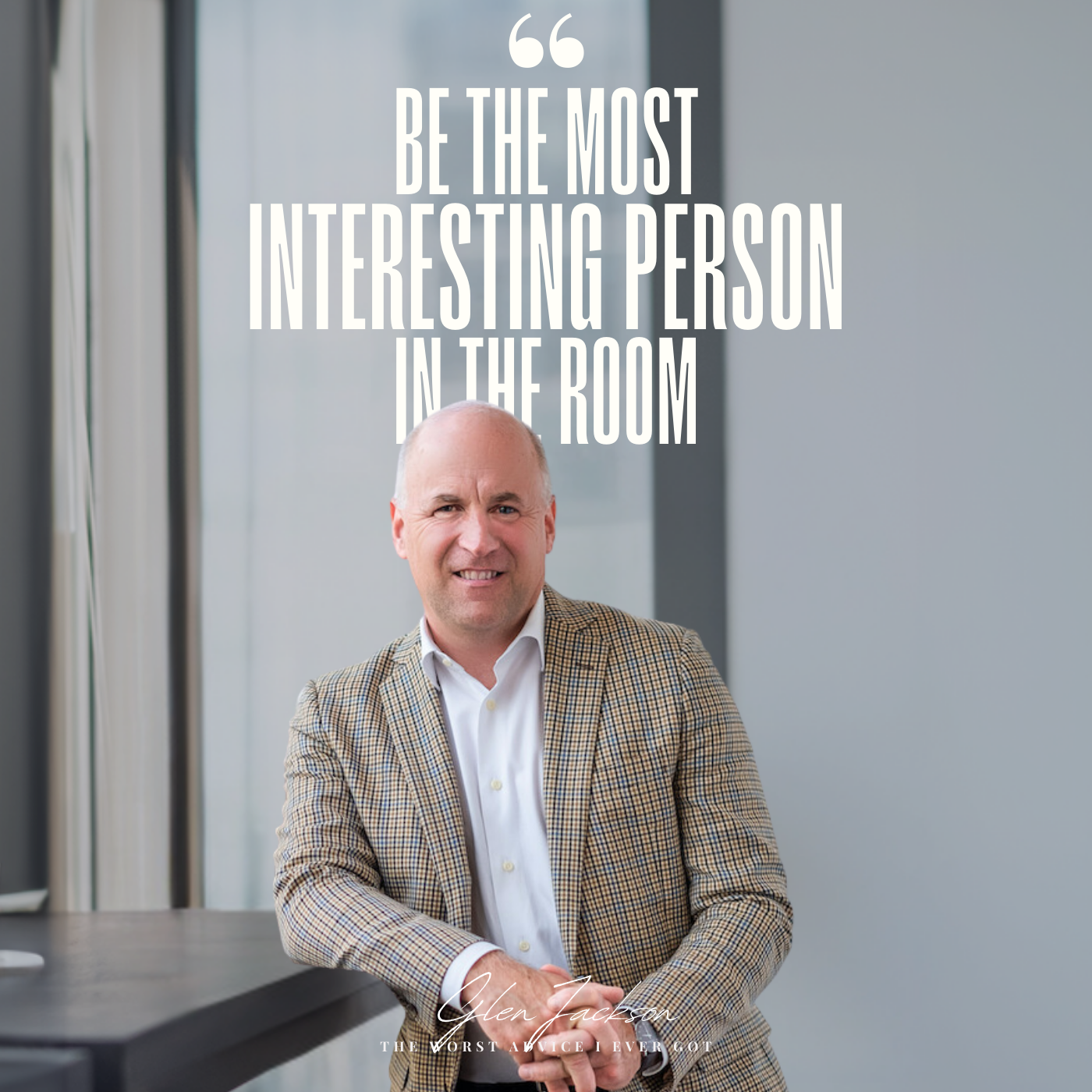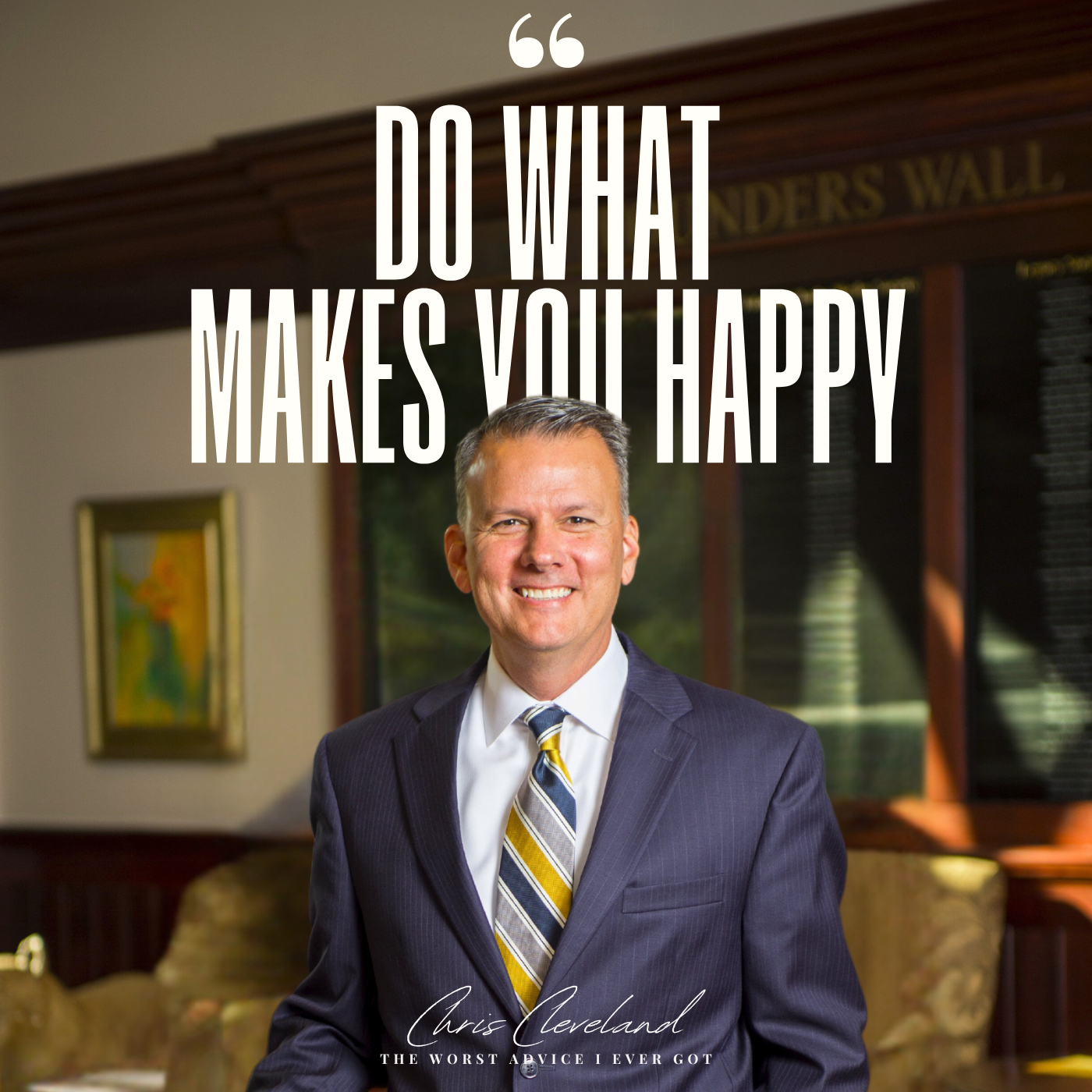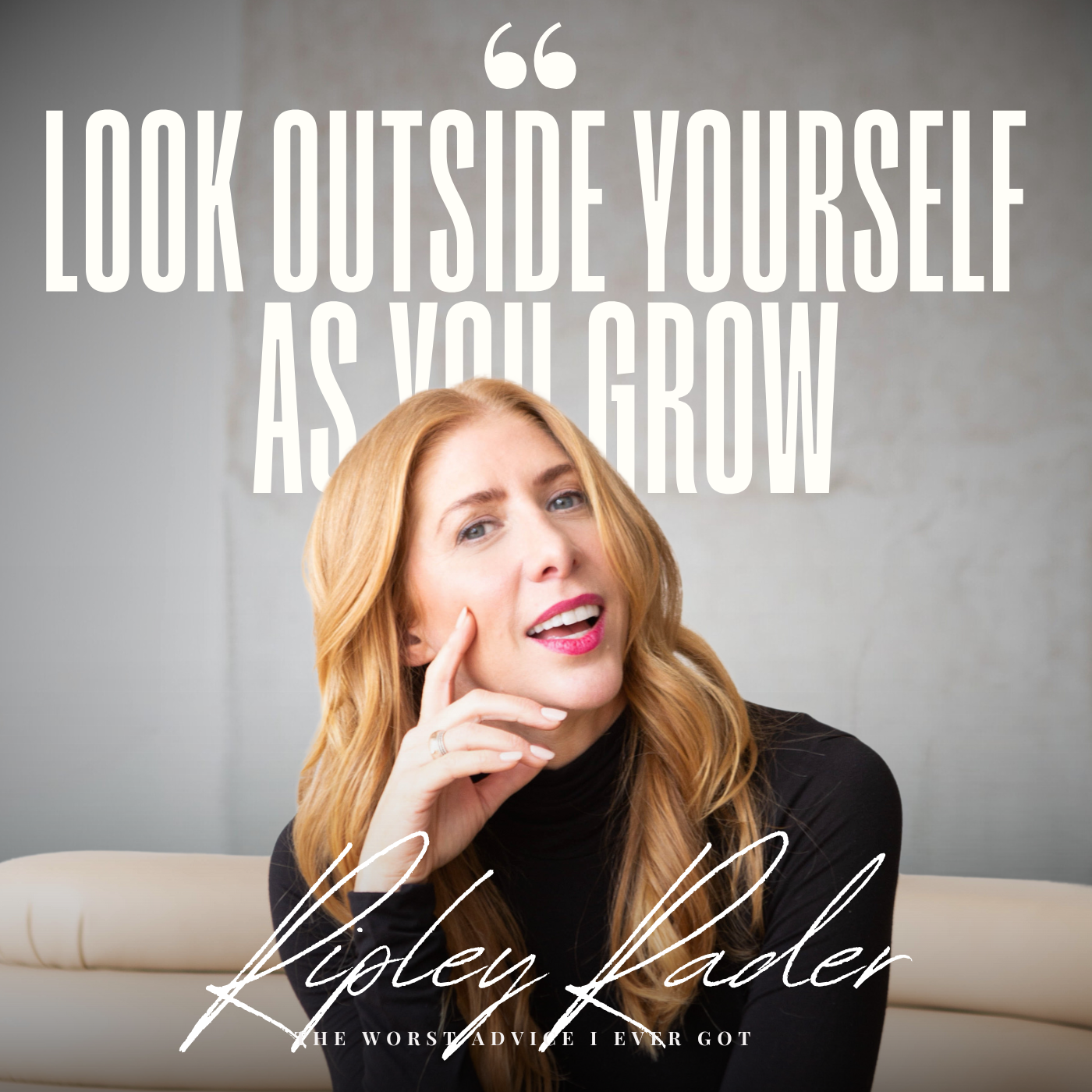Episode Transcript
[00:00:05] Speaker A: Hey, everybody, and welcome to the worst advice I ever got. I'm your host, Sean Taylor, along with my producer JB. And today we're talking with Glenn Jackson. Glenn is the co founder of 360 degree public relations and marketing agency, Jackson Spaulding. Since starting the company almost 30 years ago, Glenn has since authored the book Preeminence, is a board member of World War two Foundation, and recently received the highest award for community service given by the YMCA, the Bransby Christian Leadership Award. Glenn, thanks so much for talking with us today.
[00:00:40] Speaker B: Thanks for having me.
[00:00:41] Speaker C: I feel like I should know this because we're friends, but what is the worst advice you ever got?
[00:00:47] Speaker B: The worst advice I ever got was be as interesting and as captivating as possible with other people.
[00:00:55] Speaker C: Do you recall any of your reaction or feelings when someone told you to try to be that person?
[00:01:03] Speaker B: It felt uncomfortable, but I tried and it didn't work.
[00:01:07] Speaker D: Well, it doesn't seem like bad advice. Be the most interesting person. Wasn't wrong with that.
[00:01:12] Speaker B: Yeah, I tried going to an event, a networking event.
[00:01:17] Speaker C: Okay.
[00:01:17] Speaker B: I'm in my mid twenties, by the way.
[00:01:19] Speaker C: Oh, okay.
[00:01:20] Speaker B: Yeah.
[00:01:21] Speaker A: What happened?
[00:01:22] Speaker B: I just didn't connect with people doing it that way. I really thought about it. I'm young, you know, I'm trying to meet people, get to know people, connect with people. I've got a little bit of introvert in me, and I mean extra introvert. So the introvert in me is very hard to just be out there in that captivating, interesting frame of mind all the time with other people.
After a while, decided not to do it anymore.
[00:01:51] Speaker C: Just tell me a little bit more about the background of the individual that you got this from.
[00:01:55] Speaker B: It was one of my bosses.
So I've got this mandate, if you will, to be as interesting and as captivating as possible whenever I'm in a networking setting.
[00:02:10] Speaker C: Yeah. Tell me a little bit about how you went from that point to maybe something a little bit different.
[00:02:15] Speaker B: What happened with me, Sean, is when I reflected on it, I realized that not only was the be as interesting and as captivating as possible, terrible advice, but the focus on networking was also poor advice. I flipped everything and did the opposite.
[00:02:35] Speaker C: Okay.
[00:02:36] Speaker B: And I can.
[00:02:37] Speaker D: What's wrong with networking?
[00:02:38] Speaker C: Yeah, yeah.
[00:02:39] Speaker A: Let's.
[00:02:39] Speaker C: Let's go down that path a little bit because. Yeah, because being interesting and captivating doesn't necessarily just have to happen in a networking environment. This was in a networking environment, and now you're even questioning the whole aspect of networking.
[00:02:52] Speaker B: Networking is about meeting people. It's oftentimes not sincere. It's about talking and taking. And the conclusion I reached is that relationship building is where I needed to go in relationship building, instead of just meeting people is about investing in people.
[00:03:15] Speaker C: Did this take you three weeks, three months, three years, years to figure out? Yes. Yeah. Good. I feel better about my path now.
[00:03:24] Speaker B: Sitting here thinking it took a while. I think it came with a lot of maturity as a person as well as a professional, thinking a lot about who I wanted to be about going forward in my career.
[00:03:37] Speaker C: This is really interesting because for our listeners, if they listen to the first episode of the worst advice I ever got, that you have to make a good first impression. And ultimately what it ended up doing to me was having me change who I naturally was.
I just need to build relationships and everything else will come.
[00:04:02] Speaker B: Instead of being the most interesting person in the room, be the most interested person in the room.
[00:04:08] Speaker C: Oh, I like that.
[00:04:09] Speaker B: Instead of being the most captivating person in the room, be the most curious person in the room.
[00:04:15] Speaker C: That's great.
[00:04:16] Speaker B: So that's how I flipped it. And then I came up with my own definition for relationship building. Relationship building is a commitment to establishing and investing in relationships that genuinely matter to you. And I think the best relationship builders do a lot of things, of course, but three in particular. One is they invest sincerely in relationships. Two is they personalize to maximize the relationship. They write that handwritten note thanking the client or the friend for that piece of advice over lunch, and they do it sincerely and also quickly. They don't wait for two weeks to do it. And the third thing is they're more interested than interesting. Those three combined can be extremely powerful in the relationship building process. And one thing I've seen is that there are four types of relationship builders and each has a mindset. And Sean, what I've learned too is that everybody has a primary and secondary relationship building strength among these four as I go over them. So keep that in mind. The four are investors, connectors, personalizers, and observers. And they each have a mindset.
[00:05:30] Speaker C: And so I might be naturally inclined to be an investor, but secondarily I could jump into the connector phase. Depending upon the environment, depending upon the exchange, yes.
[00:05:40] Speaker B: And the four mindsets for each are the investor is long term low pressure. She takes a very long term view. And in building and investing in the relationship, the connectors mindset is genuine, always wins. They don't have an agenda in connecting other people. They just want that connection to happen and just see how it evolves. The mindset for the personalizer is personalized to maximize. They are great at all these personalization steps and the things they do tangibly for people they value. It could be send someone a podcast or a book, or they're just personalizing all the time, leaving that voicemail and that voicemail is just toe timely in the morning. I'm thinking about you this morning and I appreciate you so much. And the observer is the introvert, typically he or she. The mindset there is trust your intuition to spark action. They're very intuitive and they have extremely high emotional intelligence. And they see the room with a wide angle lens and they listen keenly when in meetings and they're observing a lot, maybe listening more than talking probably for the observer.
[00:06:50] Speaker C: What's your primary, what's your secondary? And how does one go to figure out what it is for them?
[00:06:58] Speaker B: I'm a primary investor secondary connector and I've strived over the years to be actually effective at all four and those types. But those are my two strengths. And we've come up with a test to determine your primary and secondary as a relationship builder. Our agency Jackson's balding developed that test. It's been very interesting to see who at our agency, for example, are we leveraging your primary and secondary relationship building strengths?
[00:07:28] Speaker D: What if both people are trying not to be the most interesting person in the room? What happens then?
[00:07:35] Speaker B: Yeah, a lot of great questions are asked.
It goes deep pretty quickly.
[00:07:39] Speaker D: So you can do that. You could both be trying to not be the most interesting person still. Yeah, it's good advice for everybody.
[00:07:45] Speaker B: Absolutely.
[00:07:46] Speaker C: I think by not trying to be the most interesting person in the room, you might become very interesting to someone else.
[00:07:53] Speaker A: It's like, okay, he or she seems.
[00:07:55] Speaker C: To be more interested in me than they are themselves, which is, gosh, talk about unique. These days, I mean, we live in a, you know, self promoting world. Have you ever encountered someone who was basically doing what JB said, trying to be less interesting and it just really got deep? And what did that do in that conversation? Or how did that relationship ultimately develop?
[00:08:19] Speaker B: I think it actually those types of conversations that you have when both people are extremely interested, curious.
I think you cover subjects that are not on the surface. You actually go deep on things. And it's not snorkeling, it's scuba diving in the relationship building process. And you have a friend for life.
[00:08:44] Speaker C: Yeah, that's a great analogy. Going deeper. And then you concluded that with having a friend for life. It would feel like to me, our clients most memorable encounters with us in our business is probably not a piece of advice we gave them, probably not something we told them to do or a statement. It's probably a question we asked.
[00:09:02] Speaker B: Yeah, superb point. Totally agree. Someone asked me recently in a meeting, you know, what do you want to stop, start and continue doing this year? What a great question for all of us.
[00:09:16] Speaker D: What do you think the difference is between not being the most interesting person in the room and still being an advocate for yourself?
[00:09:25] Speaker B: Well, I think at the right time, once you've built trust with someone, then that's what you should be doing, giving them clear, Chris. Strategic advice on situations and presenting to them the value you bring to the table for solving that potential problem. And so much of what we do relates to the communications piece and helping organizations communicate more effectively to the critical audiences they want to reach over time with clarity and integrity.
So you just know, you instinctively know when it's time to put on that hat of being a strong advisor who's also trusted.
[00:10:08] Speaker C: I hear you advising your clients there with that statement you just made, saying to them, before you deliver a message, you better have developed trust.
[00:10:19] Speaker B: Yeah, and I'll put it another way. Thanks for saying that, because it made me think of something. Networking is transactional. Relationship building is transformational. And in life and in business, treasure people more than possessions. That will help you in so many substantive ways, personally and professionally.
[00:10:40] Speaker C: I'm sitting here thinking about the term networker now, and I'm beginning to visualize that as a person in the room that is speedily going from person to person, you know, exchanging cards. I guess these days it's just exchanging information. We don't do as many business cards as we used to, but the whole point is, is there wanting to go home and say, I met 120 people tonight versus saying, I developed one strong relationship tonight.
[00:11:14] Speaker B: And it's interesting that the word network has the word work in it, and it shouldn't feel like that. Relationship building should feel effortless and natural and be something that you're very comfortable doing, because at the core it's who you are.
[00:11:33] Speaker C: Some people are very structured, like they approach everything with a calendar set and a plan. And that's not necessarily a bad thing, right? It's the action of making the investment and being curious. However you get to that point is, okay, so you don't have to be naturally a people person, so to speak.
[00:11:52] Speaker B: Some folks might be listening and going, well, I'm an introvert, you know. Yeah, I can't do this. I tell you, some of the best relationship builders actually are introverts. They're narrow and deep, not wide and shallow in the relationships they forge over time. And they're extremely reliable as people who have trusted relationships with people, they're very reliable. And it's extremely powerful to watch the introverts in action from a relationship building standpoint because they're very strong as observers.
[00:12:22] Speaker D: Who do you think the advice is more damaging for? So be the most interesting person in the room, and you're saying, that's bad. The extrovert or the introvert?
[00:12:30] Speaker B: I think that if you're already extroverted, if you're already an extrovert, good grief.
Are you doing jumping jacks in the middle of a meeting, singing a song? Let me play my guitar. I want to have you hear this song. And then the introvert, like me, in a lot of ways, is like this. Feels like you're trying to make me do everything with my left hand when I'm right handed. So it kind of works against you. Whether you're an extrovert or an introvert.
[00:12:58] Speaker C: You'Ve got young people in your business today.
When you notice them attempting to be interesting, how do you address that with them?
[00:13:07] Speaker B: I hope they see me doing the opposite. So maybe it's more taught. It's more caught than taught.
[00:13:13] Speaker C: Yes, we're talking about this in relation to work, but I suspect this has been even more impactful in your personal life than in your career.
[00:13:23] Speaker B: Absolutely.
[00:13:24] Speaker C: Any thoughts on that?
[00:13:25] Speaker B: Absolutely. You know, I've received some wonderful notes from my friends over the years. One of my most special notes from Scotland, Wright, a dear friend of mine, on the 75th anniversary of D Day, wrote me a letter my dad took part in that. He was a D day tank driver and Pow for a year. Wounded, escaped, recaptured. And Scotland just said, you know, I just want to write someone today, and I just want to tell you how thankful I am for your father, for his acts of bravery on that rough, rough morning. And that letter is in the diary that my dad kept when he was a PoW. That's a note I have in there from Scotland. Just one note, and it's from him.
[00:14:11] Speaker C: My first thought is, it's just a great example of doing just what you've been saying here, being more interested than interesting and investing in building relationships. What a terrific example. As we wrap up today, I wanted to ask you, you know, people get bad advice all the time, right? We. Maybe in the moment, we don't know it's bad advice. Maybe it takes time to figure out that it's bad advice. How do we grow from the bad advice we get.
[00:14:41] Speaker B: What a great question.
You know, for me personally, I guess the silver lining is that the bad advice that I received once I recognized that it was really bad advice has strengthened me by doing the opposite and growing accordingly. So I'm actually, in a way, thankful for the bad advice, because the silver lining is, it was a wake up call for me to do the complete opposite of it and move forward, in a way, professionally, that was such a non awkward feeling.
[00:15:26] Speaker C: Yeah. Glenn, thank you. Thank you for having us today.
[00:15:29] Speaker B: Appreciate it.
[00:15:30] Speaker C: Oh, it's been a delight.
[00:15:31] Speaker B: Thanks for your friendship.
[00:15:33] Speaker C: Thank you.
[00:15:34] Speaker A: You know, JB, my first reaction to.
[00:15:36] Speaker C: This is when you get advice from.
[00:15:39] Speaker A: Your boss to do something and you do it and it's not working for you, what in the world are you supposed to do?
[00:15:45] Speaker D: Yeah. Especially mid twenties. I mean, that's when you don't know anything. You think you know everything, and then somebody says something to you. So direct. You're like, here's what you should do. And you're like, okay. And you do it, and it does not work. I just. It's. That's tough.
[00:16:00] Speaker A: Yeah. And whether you think you know everything or maybe in some cases, you worry you don't know anything, either way, it's not working, and you're left going, okay, now what do I do?
[00:16:11] Speaker D: And, you know, he said it took him a long time. Um, Glenn is very respectful person, so it's not. Does not surprise me that he would like, you know, I'm really going to make sure this advice isn't for me before kind of giving up on it. Um, but, you know, turned all the way around for him.
[00:16:26] Speaker A: You know, I pause for a minute and I think about when I first started out, I can't recall getting that advice, but I can certainly recall seeing people who are really, really impressive, who were fantastic at developing business. And my interpretation of them is that they were impressive. You know, they were really wowing the people they were working with. And that's what Glenn is saying is that's not what they were doing.
[00:16:52] Speaker D: Right. Being more interested in the other person. I think that was what his ultimate kind of takeaway was, is that if you try to be the most interesting person in the world, that's going to be tough. I'm definitely an extroverted person, and he's like, you know, if you're an extroverted person, all trying to also be the most interesting person in the room, like, what are you going to do? Jumping jacks, you know, dance around? Like, what are you. What are you going to do to get attention.
[00:17:15] Speaker A: Yeah. Yeah. He talked about being transactional in a networking environment versus transformational in a relationship building environment, and I think he's exactly right. People ultimately are going to work with those whom they develop trust in, not who they're necessarily wowed by, if that makes any sense.
[00:17:34] Speaker D: No, absolutely. I definitely just from listening to what he was saying, I've always kind of tried to be the most interesting person in the room. I felt like that was what gave myself value. And I definitely, after listening to this episode in particular, kind of thought, Mel, maybe I should rethink that a little bit and ask more questions and be more thoughtful and, you know, anytime I'm relationship building over networking.
[00:17:57] Speaker A: Yeah, no, absolutely. Yet the other thing that I really love from this, and maybe we can leave our audience with this today, is the question Glenn asked. What do you want to stop, start, and continue doing this year? I think that's great for everybody to evaluate for themselves. I'll have to think on it some more, but one thing I do know I want to continue doing this year is this podcast.
[00:18:16] Speaker D: Oh, what a segue. Yeah, nice softball Glenn set us up with there.
[00:18:21] Speaker C: Yeah. And.
[00:18:22] Speaker A: And there was no compensation for it either. Just thank you, Glenn. We appreciate it.
[00:18:26] Speaker C: Yeah.
[00:18:27] Speaker A: Well, that about wraps it up for this week's episode of the worst advice I ever got. Thanks to our guest, Glenn Jackson, for joining us today. If you like what you heard from Glenn or what you're hearing from us in any of our episodes, help us out with a five star rating whenever you listen to your podcasts and tune in next week when we're back for more of the worst advice I ever got.



